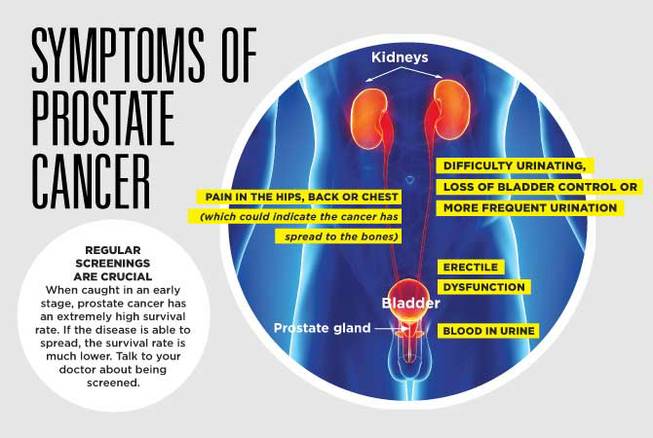
Sunday, Sept. 20, 2015 | 2 a.m.
The American Cancer Society reports that 1 in 7 men in the United States will be diagnosed with prostate cancer in their lifetime.
While that number is high, prostate cancer deaths are considerably less common — only 1 in 38 men will die from prostate cancer — and it’s likely those numbers could be lowered further.
“Proper screening and early detection is the most important thing when dealing with prostate cancer,” said Dr. Jayram Krishnan, DO, a urologist at Cleveland Clinic and Sunrise Hospital and Medical Center.
What is the prostate gland?
The prostate is a small, walnut-sized gland in the pelvis. It sits between the bladder and the penis and in front of the rectum. Urine flows through the prostate after leaving the bladder.
What does the prostate do?
The prostate gland’s job is to create and secrete a component of seminal fluid that protects the sperm and allows it to stay alive longer once it reaches the vagina.
Am I at risk?
Although most men will need to be screened annually, doctors use a risk algorithm to tailor the frequency of screenings to individual patients. The algorithm includes age, race and family history.
Age: Prostate cancer is very uncommon in men under 40, but the risk increases dramatically after age 50. The majority of prostate cancer incidences are found in men 65 or older.
Race: Prostate cancer occurs most often in black men. Non-Hispanic white men have the second-highest incidence rate, while Asian and Hispanic/Latino men tend to have the lowest incidence rate.
Family history: Men whose father or brother(s) have had prostate cancer are much more likely to develop the disease. “There’s a very strong genetic predisposition for prostate cancer,” Krishnan said. Risk continues to increase as more relatives have had the disease and is especially high if relatives were diagnosed while young.
What is the screening process?
Rectal exam: While rectal exams are quick and painless, many men are hesitant to be screened regularly. “I know that it can be uncomfortable for some patients, but screening saves lives, that’s all there is to it,” Krishnan said. Rectal exams typically take a few seconds and need to be done once a year for most patients, although that can depend on a person’s risk factors. During the exam, doctors check for enlargement, lumps, hardness and changes in the prostate. While changes are not always indicators of cancer, they should be monitored. “It’s also important that patients know that any physician can give a prostate exam, not just urologists,” Krishnan said.
Blood test: A prostate specific antigen (PSA) blood test can be done to check for cancer. The chance of cancer increases as PSA levels in the blood increase.
Ultrasound, MRI and/or biopsy: If the above tests suggest cancer may be present, a doctor also may perform an ultrasound and/or biopsy to confirm the diagnosis.
Symptoms of prostate cancer
Early-stage prostate cancer typically does not cause any symptoms, which is why regular screenings are so important. Late-stage prostate cancer symptoms are:
• Pain in the hips, back or chest (which could indicate the cancer has spread to the bones)
• Difficulty urinating, loss of bladder control or more frequent urination
• Erectile dysfunction
• Blood in urine
Treatment
Prostate cancer is an extremely individualized cancer and very treatable. However, some individuals can die from it if not screened properly.
For patients who do require treatment or for patients whose cancer has spread, surgery, radiation and/or chemotherapy all may be options. However, with recent studies and technologies, Krishnan estimates only 1 of 4 instances of prostate cancer will require any treatment at all.
When treatment is not required, regular monitoring of the cancer will allow patients to live normal, healthy lives and will help ensure the cancer doesn’t escalate.
In general, prostate cancer responds well to treatment when required and can be managed easily if treatment is not required. But a positive outcome often depends on the regularity of screenings.

Join the Discussion:
Check this out for a full explanation of our conversion to the LiveFyre commenting system and instructions on how to sign up for an account.
Full comments policy